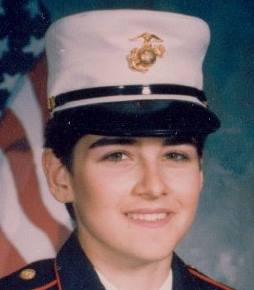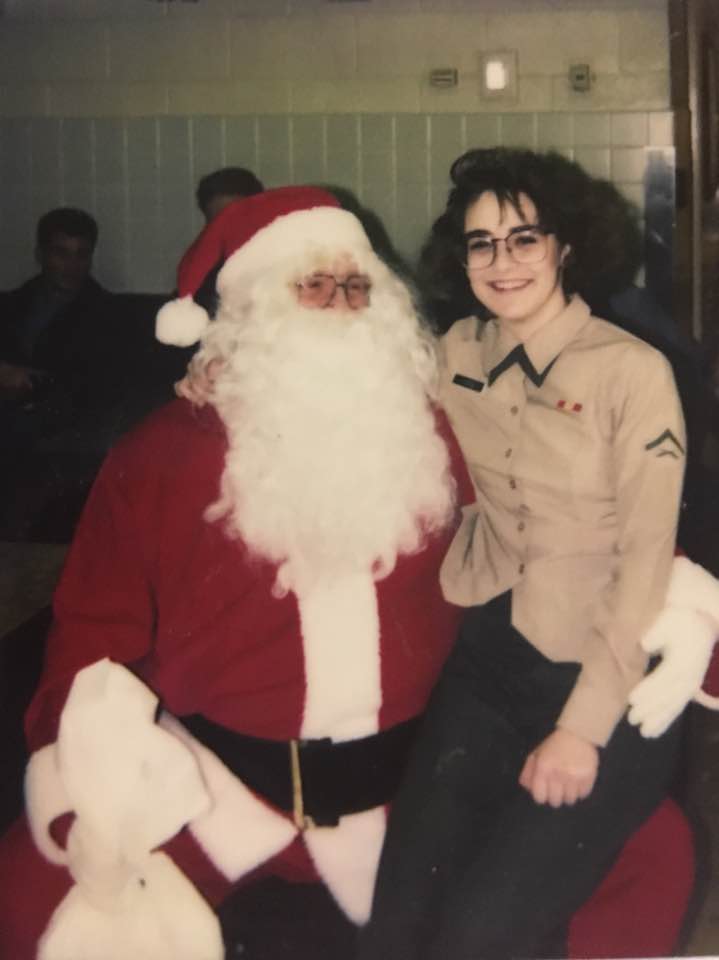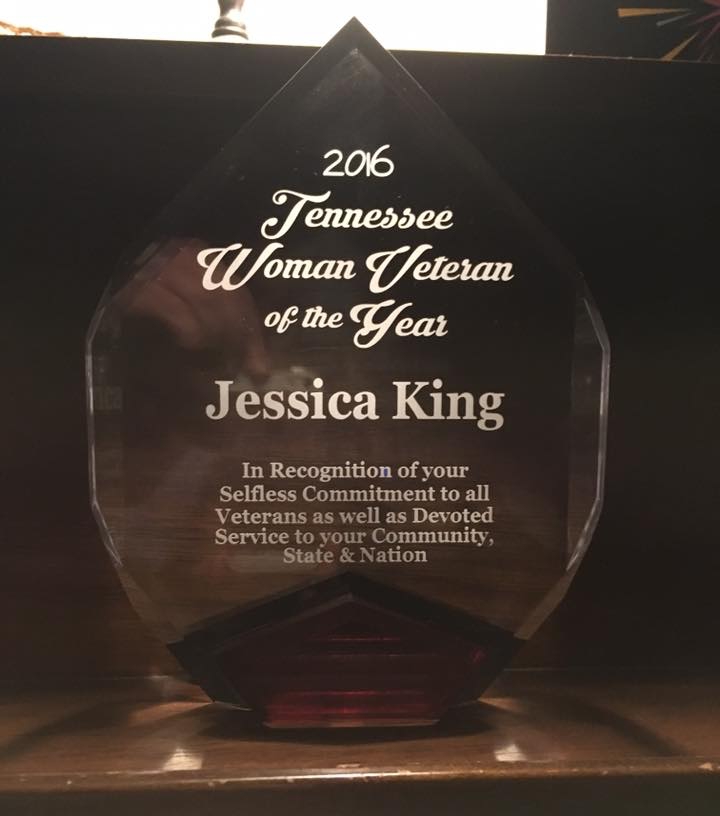Jessica Hodge is a Desert Storm Veteran who’s calling in life is helping women Veterans. She is open and candid about her personal experience and it speaks directly to the challenges faced by many women in the military, and later as members of the Veteran community.
HER SERVICE IN THE USMC
Hodge was active in the Marine Corps from 1989 to 1998. She joined on a band contract, but basic training pointed her in another direction. She studied at the Defense Language Institute and went to work as an Audio Surveillance Specialist.
AN ACCIDENTAL WAR VETERAN
She is a Desert Storm Veteran by accident—The Marine Corps thought they were sending her twin brother Jessie, who’s social security number is nearly identical to hers. He was still in basic training at Parris Island in 1991 when she first deployed to the Gulf. She worked with the Marine Corps Radio Reconnaissance Team setting up communications. “We would go in different places before anyone hit the ground with boots, so to speak. We vetted the situation and determined where things were going.”
During one mission, she happened to be listening to a phone conversation between a Syrian and a young Saudi Royal. She thought nothing of it until a few years later when the North Tower of the World Trade Center was bombed. There was renewed interest from above in the phone conversation, because she had been listening to Osama Bin Laden.
HOW A YOUNG GIRL BECAME A MARINE
A WAR OF SURVIVAL
Hodge’s path to the Marine Corps was the result of a different kind of war—the kind that some kids must wage just to survive childhood. She was born in a small town in the Adirondacks to alcoholic parents who seemed to have little interest in the wellbeing of their daughter. “We were the white trash family. I had hand-me-down clothes that didn’t fit, and they were never clean because my mother wouldn’t do the laundry.”
PLANNING HER ESCAPE
It was clear she would have to figure things out on her own, and college seemed like a solid plan of escape. “I worked my entire childhood. My Grandparents had a restaurant. I worked in it until they retired and sold it, and I worked in other restaurants.” By 1989 she had saved $12,000—the equivalent of more than $25,000 today.
Hodge did well in school and earned a scholarship to SUNY, but it didn’t cover everything. When she went to the bank to get a cashier’s check for the application fee, she was stunned to find just $7 in her account. As a minor, she needed a parent on the account with her. Her mother went behind her back and stole nearly all of the money she worked so hard to save, along with her means of escape.
CONSIDERING OTHER OPTIONS
There was an uncle on her Mom’s side who suggested a different path. “He was in the Marine Corps at the time. He was only four years older than me and we grew up together, so we were close. He’s like a big brother. He told me, you should go into the Marine Corps. And I did. Never regretted it.”
The recruiters did not know what to make of her. “They acted like I was crazy! And I had to get a weight waiver. I was 17 years old, five feet even and 84 pounds.” Hodge excelled on her ASVAB and asked to audition for the Marine Corps Band. She was the only person in her group to make the cut. Her parents had no idea she’d spent several months planning for this, and now she needed one of their signatures to make it official.
“So I caught my father after work when he was in a really good mood before he started drinking, and he was like WOW!” He was blown away by what she had accomplished and seemed oblivious to the fact that she did so despite his subpar parenting. She was standing by with a pen and he was more than happy to sign.
She joined the Marine Corps at just 17 years old and had no fear about it. “The only thing I was scared of was getting kicked out and sent back home.”


WOMEN IN THE MARINE CORPS
Hodge became a Marine at a time when women were only 4% of the USMC population, and not much has changed in the 30 years since. As of 2018, the Corps is still just 9% female.
The Marine Corps, dating back to 1775, is the only branch of the US military still training men and women separately. But the 2020 Defense Authorization Act requires that to change in the next few years. Hodge is on the fence about it. Having been in an all-female battalion, she appreciated the ability to talk about things like gear fit and to build a Sisterhood with her fellow female Marines. But she also sees value in training together, especially for the young men who join.
“It puts us on a level field and lets the male Marines know early on that you’re gonna have to work with women. Because that’s really a big problem in the Marine Corps.” As an example, a male infantry Marine will go through basic training, Marine Corps combat training and School of Infantry without women. Gender integration often doesn’t happen until they land their first infantry job, where they will suddenly be expected to work alongside their female peers, despite zero experience doing so. She sees a benefit to integrating classroom instruction, physical training, and dining as other branches of the military already do.


INJURY AND MISDIAGNOSIS
Hodge’s service led her to Haiti in 1994. While there, she and several other members of her unit were injured when their Hummer rolled over in difficult road conditions. “It was kind of dumb. It wasn’t like anybody shot at us or anything. Basically it’s like a car accident.” But it would affect her health and wellbeing for many years to come.
She was triaged at Guantanamo Bay Naval Base in Cuba and sent home to Portsmouth Naval Hospital in Little Creek for surgery. This meant inserting metal plates and pins in both feet, ankles and several toes. The Marine Corps let Hodge stay after the incident, and she played clarinet in the Marine Field Band at Parris Island during recovery.
A DIFFICULT TRANSITION FROM MARINE TO CIVILIAN
Unfortunately, the stainless-steel hardware placed in her feet led to severe nerve damage that ended her career and left her with crippling pain. When Hodge’s injury complications led to a Medical Board, she didn’t fight it. She was also in the process of dissolving a seven-year marriage, which would require a complicated family care plan for her two children if she stayed in. Ultimately, she ended her career in the Marine Corps along with her marriage.
A NEW PATH OF SERVICE
After the military, she landed a work study job in Clarksville with the Tennessee Department of Labor while studying for a degree in social work. She happened to become the first facilitator of the brand-new TAP (Transition Assistance Program) at Fort Campbell, Kentucky. She loved it immediately, and set to work making sure the new Veterans in her classes were well armed with the information they would need to transition successfully back to civilian life.
Three months into the job, a VA service officer came to audit her TAP class and wrote a scathing report of her approach to TAP. “He said I gave way too much information on benefits they can apply for when they get out, and it’s not my job.” Afterward, her boss told her she broke the unspoken golden rule at the VA at that time, which was no advertising the benefits that Veterans were eligible for. He supported her anyway and told her to keep pressing forward.
…being admonished for helping Veterans was a pivotal moment that only made her more determined to be of service.
Thankfully some things have changed in the 20 years since Hodge’s first TAP classes. The VA recently launched a program specifically for women transitioning out of the military, which acknowledges women’s unique health care needs and helps them better understand the benefits and medical care available to them through the VA.
But for Hodge back in the early 2000s, being admonished for helping Veterans was a pivotal moment that only made her more determined to be of service. “At that point, that’s when I knew that I wanted to continue to help Veterans. That’s what I wanted to do with my life.”
A ROCKY PATH HOME
Hodge met someone new and moved her family to Knoxville to start a new life there. She learned quickly that the relationship was a mistake, but life had already been upended for the move. For the sake of her son and daughter who were now in elementary and middle school, she decided to stay. It would prove to be a good decision for her in many ways.
THE SEARCH FOR A VETERANS GROUP WHERE WOMEN WERE WELCOME
After righting herself in Knoxville, Hodge finished her degree in social work at the University of Tennessee and set about immersing herself in the Knoxville Veteran community.
She joined the Marine Corps League, where she was pushed toward the auxiliary for spouses and discouraged from coming to regular meetings. When her husband tried to join the auxiliary, he was told they didn’t allow men. “I stayed on for a year and was on a committee, but they treated me like dirt, so I stopped going… I also joined the American Legion, and it was the same thing.”
Next, she tried the local VFW, which seemed more like a bar than a place for her to feel welcomed or seen as a Vet. “An old man slapped me on the ass. Wanted me to bring him a beer. Wanted me to sit in his lap. I never went back.” There were a few other false starts, and Hodge became increasingly discouraged.
BATTLING THE DARKNESS
TRIGGER WARNING: The following section discusses MST and attempted suicide
The path to service for Hodge came with some heavy personal obstacles. Striking out with one Veteran organization after another coincided with a dark storm of personal events.
Unfortunately, Hodge was raped while serving in the Corps. When she reported it to her female Staff Sergeant, she was told it was hard enough for women in the Marine Corps to get by without causing problems. It didn’t help that her Staff Sergeant happened to work for the man who attacked Hodge. “She told me, it might happen again. And you just need to suck it up and accept it. If it bothers you that bad, you need to get out.”
After service she summoned the courage to file a claim for MST with the VA. Doing so requires an immense vulnerability and willingness to revisit the trauma of assault, which often leaves survivors feeling victimized all over again. Her claim was denied.
THE DARKEST MOMENT OF HER LIFE
At the same time, Hodge lost a good job where she felt safe (her position was outsourced) while wading through ongoing difficulties with her parents and the aftermath of a few bad relationships. At the time her MST claim was denied, she shared what was going on with the man she’d been dating for more than a year. He acted sympathetic, but below the surface he carried an unhealthy interest in the details of her trauma.
Between the denial of her MST claim and the storm of other challenges staring her down, Hodge sunk to an exceedingly dark place in her life. The last straw came when her ex-husband resurfaced with an expensive lawyer and demanded custody of their two children.
“I swallowed a bottle of hydrocodone. I had just met my husband at the time. We had only been dating like three months. And he found me. He took me to the emergency room. And he still loved me. And I could tell him everything—I could tell him anything.” In the darkest moment of her life, she learned what it meant to receive unconditional support, and that she was worthy of being loved.
VA CLAIMS: HER BATTLE FOR BENEFITS
Filing a service-connected disability claim with the VA is a complicated process that can take years with no guarantee of being approved or compensated. For Hodge, gender bias and a broad lack of documentation in her military records only made the task more difficult.
SIMILAR CLAIMS, DIFFERENT RESULTS
It didn’t take long for Hodge to notice how women Veterans were treated differently than their male peers. She would go to her VA for appointments and receive the same biased greeting each time. “Who are you here with? Where is your husband?”
She became friends with a female Army Veteran, and they both received care at the same VA as Hodge’s brother, who was now also a Veteran. All three of them filed similar claims around the same time. “They were all broken bone and arthritis injury claims. His was settled in six months, and ours both took like two years… it was like we didn’t matter as much.”
DOCUMENTATION, OR IT DIDN’T HAPPEN
“The Marine Corps doesn’t document a lot of things. I don’t have a DD-214 in my record. I never got it.” Instead, Hodge has a certificate of military service from the US Archives that acknowledges her honorable discharge and years of service.
Sparse record keeping wasn’t the only challenge. When she filed for disability, officials were not quick to believe her experience or participation in specific operations. “Because I was a woman, there was no way I was at those places doing those things. It took years of getting documentation from people because most of it wasn’t in my record—it just says TDY.”
BUDDY STATEMENTS SUPPORTING HER CLAIM
There is no official record of the incident in Haiti where Hodge was hurt. Thankfully she was not alone when it happened. But it would take the proliferation of social media to help her get the documentation she needed. Fourteen years after she filed her first claim for those injuries, she found the medic from her old unit on Facebook and got him to write her a statement. This led to three other guys in the accident who wrote statements for her.
To her good fortune, an enlisted man who was there when the Hummer rolled over later converted to officer. He was a retired Major by the time he wrote her a statement—one that would be especially impactful on her claim. It said, “I served with her—she was in this accident and she’s not the only one—there were six of us.” And he listed the others by name. For Hodge, that was the tipping point that helped get her injury claim approved.
She still faced a battle to be properly diagnosed or find appropriate relief for her decades of chronic pain. A correct diagnosis would come eventually, but not without many years of persistence on her part. In 2019, the VA finally rated her for neuropathy and approved her for a spinal cord stimulator. She had the procedure in October 2020 and felt a difference immediately. “My pain disappeared! I was so shocked and relieved that I cried.”
FINDING HER CALLING
Back when Hodge was still climbing her way out of the lowest period of her life and struggling to find the right Veterans group, she met a fellow woman Veteran who was also looking for a place to call home. Together, they started a local chapter of a national women Veterans organization and got to work making a difference for others. It helped her to see daylight and start feeling good about herself again. Their group attended the local Stand Down for homeless Veterans and noticed there was nothing for women. The next year they came prepared. Her group offered women’s clothing and hygiene products, and brought the local hair salon to provide free haircuts.
CLEANING UP A LOST VETERANS PARK
Her group was also the driving force behind the re-establishment a lost Veterans park in Knoxville. The park had fallen deeply into disrepair since it was first dedicated in 1952. Six decades later, not even the Mayor was aware of the blighted park’s original purpose.
As Commander of her local chapter, Hodge convinced other local leaders of Veteran organizations and military units to support their cause. The project was green lit by the City, and a coalition lead by Parks and Rec was created. More than 200 people came out to help clean up the park. Sharp’s Ridge Veterans Memorial Park is now once again a beautiful place to honor the Veterans of Knoxville.
During this project, Hodge was instrumental in starting the Veterans Heritage Site Foundation. The non-profit is tasked with preserving and maintaining local Veteran heritage sites for future generations. VHSF created the annual War Dog March, which will eventually fund the creation of a War Dog Memorial Park.
A lot of good work was accomplished by her local chapter in the space of a few years. But eventually the group disbanded after they stopped receiving support from national headquarters.
THE AMERICAN COUNCIL OF WOMEN VETERANS
The following year, Hodge and a few other women from her group started the American Council of Women Veterans. The idea was to try to fix some of the things about Vet groups that didn’t seem to work. It has been a slow process. But she is passionate about working with other women to create an accessible space where women Veterans genuinely feel welcomed and supported.
I think with the pandemic and Zoom and social media making it easy to connect—it’s forcing people to learn how to do these things and see how easy it is. I think this is the future of Veteran Service Organizations.
Jessica Hodge
The American Council of Women Veterans is a registered 501(c)(3) striving to unify women Veterans across the country in ways that will survive a quickly changing world. Hodge thinks traditional chapters and formal meetings are a dying breed, and there are some gifts to be found in pandemic living. “Veteran Service Organizations are having a hard time keeping their chapters going. I think with the pandemic and Zoom and social media making it easy to connect—it’s forcing people to learn how to do these things and see how easy it is. I think this is the future of Veteran Service Organizations.”
Her vision is to create a no-hassle VSO where women can connect, support each other and organize into a group powerful enough to be a strong voice for the needs of women Veterans. There is a Facebook group, and a website is being built with a members-only area for meetings and official communications.
HER VETERAN IDENTITY
Many women struggle to see themselves as Veterans once their service ends, and for many years Hodge was no exception. “It took a lot of being with all these other women who were Veterans, and doing something to help other Veterans.” Helping homeless Veterans, getting a Veterans park cleaned up and re-established—doing that kind of work helped bring Hodge out of the darkness, and it led to her being named 2016 Woman Veteran of the Year by the Tennessee Department of Veteran Services. It was a validation she was not looking for, but meaningful none the less.


THE RESPONSIBILITY OF BEING A VETERAN
Now that time has put distance between Hodge and her time in the Marine Corps, she has slowly learned to see herself as a Veteran. “It’s part of me. It’s something that can’t be taken away from me. And I have very few things in my life that I’ve felt that way about. I’ve had things taken away from me my entire life, and I kind of took it away from myself for a while. But once I really got engaged and got that fire going inside of me, I realized—no one can ever take this away from me.”
But she also sees her Veteran status through the lens of responsibility. “We are responsible to honor those who came before us. We’re responsible to our Sisters and Brothers who are here with us. If they need help or support, we’re responsible to help each other. And we’re responsible to make sure that that things are right for future Veterans. Moreover, it’s a responsibility to represent our community to the world.”
We are responsible to honor those who came before us. We’re responsible to our Sisters and Brothers who are here with us. If they need help or support, we’re responsible to help each other. And we’re responsible to make sure that that things are right for future Veterans. Moreover, it’s a responsibility to represent our community to the world.
Jessica Hodge
NO LONGER INVISIBLE
As a Veteran, Hodge doesn’t feel relegated to the shadows like many women who served. But she did for a long time. “Those of us that served between Vietnam and 9/11, we were invisible. After 9/11, that’s when people really started to pay attention. When I first got out I used to wear Marine Corps stuff, and nobody ever said anything to me. After 9/11, somebody would say, was your husband in the Marine Corps? No, I was. Oh, thank you for your service! Nobody had ever done that before. I think the world’s changing, and now is the time for us as women to really step forward and say we’re here, too. We’re not invisible. And not just as Veterans. As women Veterans. Because our experience is different than male Veterans.”
HER LIFE NOW
Hodge is clear that her path in life is helping women Veterans. She continues the work of building the American Council of Women Veterans into an organization where women Veterans can feel welcomed, seen, heard—and most importantly—advocated for.
Hodge has a son who served four years in the Army, and a daughter who is an Air Force spouse. She is also married to the man who literally saved her life. They have been together for 15 years now and look forward to many more.
THE AMERICAN COUNCIL OF WOMEN VETERANS IS LOOKING FOR LEADERS
The ACWV is currently looking for motivated, well-qualified women Veterans to fill a few remaining leadership positions. For more information, connect with Sue Priest or Jessica Hodge in the American Council of Women Veterans group on Facebook.


Do you know a person or non-profit doing amazing work in the women Veterans community? We would love to spread the good word! Email us at narratives@ladyvetusa.com for a chance to be featured on the Lady Vet Blog.


